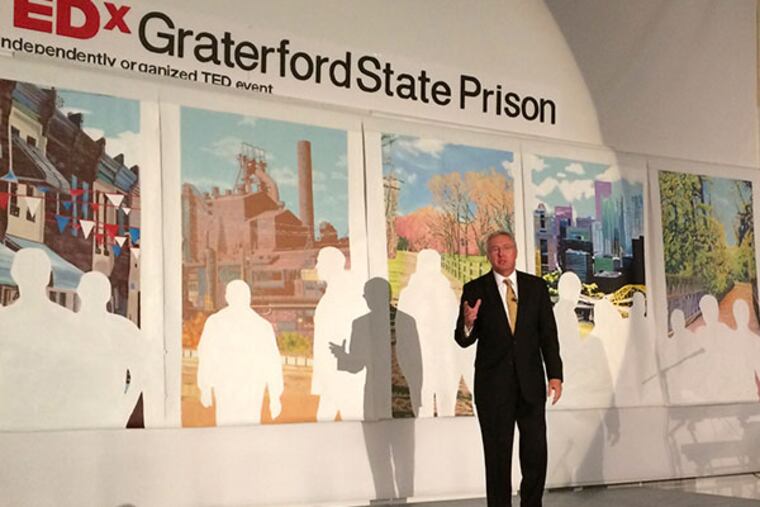TEDx for a prison crowd
The acronym TED conjures up big trading posts of ideas for the hip and the avant. Thought leaders with wide-eyed, arm-waving 15-minute talks before screens that give great graphics and music. But this was in a prison. The theme: "Concrete Visions," a rethinking of prison and what happens inside.

The acronym TED conjures up big trading posts of ideas for the hip and the avant. Thought leaders with wide-eyed, arm-waving 15-minute talks before screens that give great graphics and music. But this was in a prison. The theme: "Concrete Visions," a rethinking of prison and what happens inside.
On Thursday, Graterford Prison in Montgomery County held a TEDx - an independently run local TED (Technology, Entertainment and Design) gathering.
TEDx at Graterford was for the inmates - to give those who'll get out choices for a future, and, for those who won't, new ways to redeem their time, and perhaps themselves.
"Apparently," says Emaleigh Doley, a Philadelphia TEDx organizer, "TEDx events at prisons is something that is on the rise, which is fascinating." This is the third TEDx in a U.S. detention facility, following events at Mingus Mountain Academy, a facility for young women in Prescott Valley, Ariz., and the Marion Correctional Institution in Marion, Ohio. TEDx has also come to facilities in Spain and Moldova. More are expected.
"If TED talks were shown in prison, they would be life-changing," says activist Sue Ellen Allen. She first learned of TED from O magazine while she was an inmate in the Arizona system. "Most people in prison have never been exposed to such people or ideas," she says. "They have nothing to tell them they or their ideas are worth anything."
TEDx-at-prisons advocate Delia Cohen, a persuasive powerhouse, pitched the idea to John E. Wetzel, secretary of the Pennsylvania Department of Corrections, at a few conferences. "At first he hesitated," says Susan McNaughton, spokeswoman for the department, "but soon he was sold."
Graterford came up as the most likely place, says McNaughton, "because of its large and active lifer community, who pitch the staff on enrichment and education programs. They have created a ton of different ones, from veterans to fatherhood initiatives."
For inmates interested in speaking, the prison held an essay competition titled "An Idea Worth Sharing." A committee read essays for content and workability as 10-minute talks. Auditions followed. "It was a process," says McNaughton. "It took many hours of practice, over and over again." Marirosa Lamas, superintendent for the Commonwealth of Pennsylvania, coached winners on voice, enunciation, and presentation.
This TEDx was invitation-only, with attendance rigidly controlled. No media allowed. No streaming video (unlike many TEDx'es), but it was live-tweeted and Facebooked. The audience came from within and outside the walls. The Gospel Messengers, an inmate band, serenaded the audience to their seats.
Speakers included inmates and members of crime victims' families. Jane Golden, executive director of the Philadelphia Mural Arts Program, spoke of the social power of art. Graterford counselor Pamela Jacques painted a canvas in real time. Pennsylvania State Police Commissioner Frank Noonan told the audience that "where you are does not define who you are." Former state Inspector General Kenya Mann Faulkner said that after a tough early life in Harlem, "I tried to find my purpose which was to live my life and not just survive."
Inmate Aaron F. spoke of choices and consequences. Inmate Anthony told the audience, "I ask that you support us in our humanizing effort. We are people." Craig R. spoke of meeting his victim's sister and expressed sorrow and remorse.
Inmate Luis G., a lifer for juvenile crimes, told of being an illiterate prisoner who could not read his mother's letters. He learned to read and got his GED and a bachelor's degree. "Now I can write to mom," he said, "but she's since passed."
Norberto "Rob" Rosa spent 12 years inside Graterford and became an expert at animal care, rescue, and training. Paroled in 2005, he started working in the field and now is a team member at New Leash on Life USA, a nonprofit focused on prison dog-training.
At TEDx, Rosa spoke of his path into and out of prison and his present work with New Leash on Life USA. Inmate Corry R. had Cash, his trainee dog, show his stuff.
Rosa says New Leash on Life USA aims to give inmates "skills that will help them find an opportunity for employment, and also, we want to touch that inner being, that compassion that lives in all of us. When they understand that this dog is a living being, with its life in their hands, that gives them a purpose and makes them feel good, builds self-esteem."
Golden and the Mural Arts Program have been working at Graterford since 2002. "Art gives people meaning and hope," she told the audience. Later, she said she'd found great talent among the inmates. "Inmates have created close to 100 pieces of public art throughout the city," she said. "They've said to me, 'We understand we may never be forgiven, and we are filled with remorse. And we want to give back.' " A recent inmate-made mural now graces the side of Union Transfer on Spring Garden Street.
Will TEDx come to other Pennsylvania prisons? "The idea is floating around," says McNaughton. "Right now, we're on a TEDx high around here."